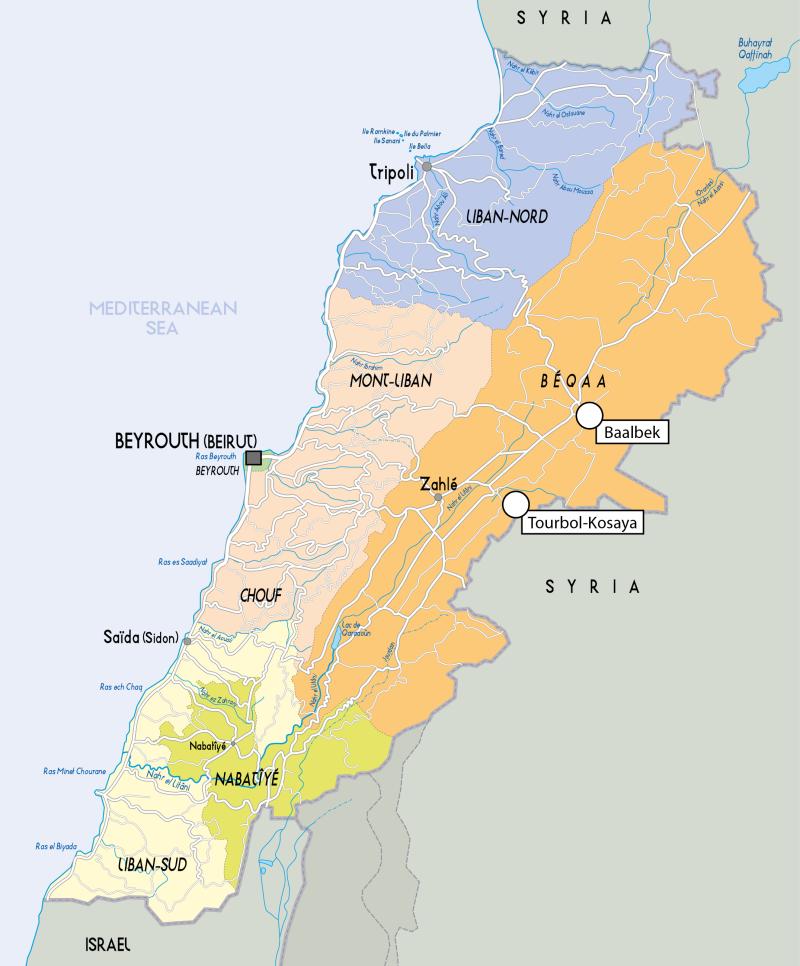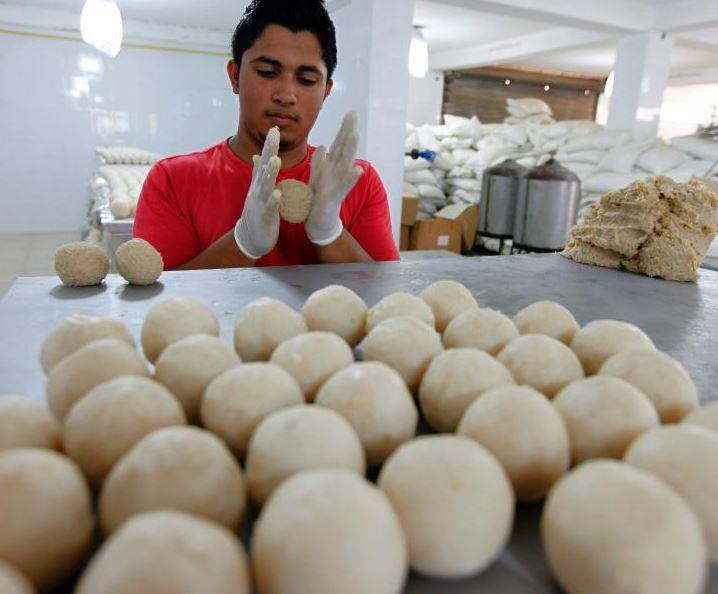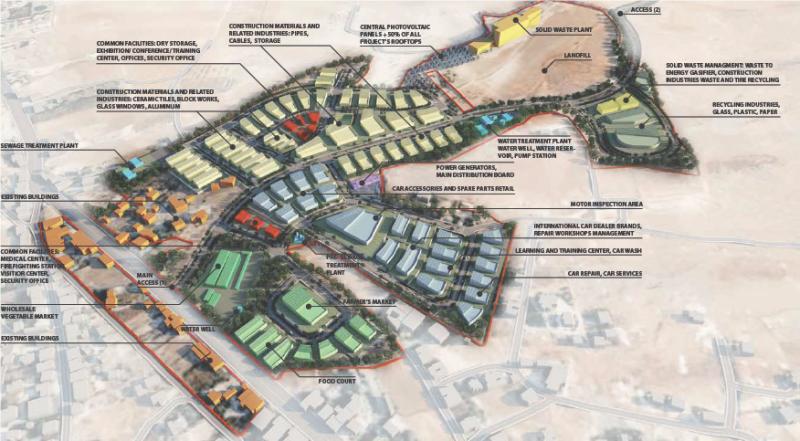Industrial zones show how EIB’s Economic Resilience Initiative helps countries respond to migration struggles
It is hard to start a business in Lebanon. Land prices are high and it is difficult to find financing. Worse, many industrial areas around the country lack proper access to electricity, communications and transport.
“We suffer extensively when we try to create a company,” says Fady Gemayel, president of the Association of Lebanese Industrialists, a group based in Beirut that advocates for balanced industrial development in all regions of Lebanon. “There are many impediments to new industries, but the main one is the cost and availability of land. This a real problem.”
The European Investment Bank is trying to fix this problem by supporting a government plan to build three modern industrial zones in Lebanon, some of which will be near the Syrian border in areas heavily affected by the refugee crisis. The hope is that more than 100 small companies will move into these zones, because land prices will be fair and the quality of infrastructure will be high.

Two of the new industrial zones will be built in areas close to the Syrian border, which will alleviate some of the strains on the Lebanese economy caused by the refugee crisis.
Increased exports
“These sites are going to allow companies to operate at a fixed low price, with reasonable costs and good infrastructure. This will expand industrial production, increase competiveness and increase companies’ abilities to export to Europe,” says Cristiano Pasini, the representative in Beirut for the United Nations Industrial Development Organization. “There also will be indirect, positive benefits on the refugee population living in the areas.”
In May, the EIB signed a EUR 52 million loan for the industrial zones under the Economic Resilience Initiative, a programme the Bank created in 2016 to address economic and social problems surrounding the refugee crisis. The zones will be the new home to agri-food, car repair and construction companies, as well as innovative firms. The EIB loan will finance the zones’ water lines, wastewater treatment, roads, electricity and other basic infrastructure.
An estimated 1,300 temporary jobs will be created and 1,900 permanent ones in the industrial areas, which will cost about EUR 105 million to build. The Italian government will help finance the construction, and other international financial institutions may help fund the project.
The Bank designed the Economic Resilience Initiative to improve growth and create economic opportunities in the Western Balkans and in the EU’s Southern Neighbourhood, which includes countries in North Africa and the Middle East.

The zones will open their doors to food-preparation companies as well as car repair and construction firms. They also hope to attract innovative firms in various other industries.
Building resilience
With the Economic Resilience Initiative, the Bank is helping countries adapt to new populations and address the causes of migration. The EIB’s support is improving infrastructure and promoting private-sector development, especially for small businesses. The initiative helps countries cope with other difficulties, too, such as an economic downturn, political crises, drought, flooding, or an earthquake.
Dario Scannapieco, the EIB vice president responsible for the Economic Resilience Initiative, says real solutions need long-term fixes.
“Economic migration is, and will remain, a constant issue for the EU,” Scannapieco says. “So we must build long-term economic resilience and help countries that face political and economic instability.”
Under the Economic Resilience Initiative, the Bank is increasing its financing by EUR 6 billion for projects in the Western Balkans, the Middle East and Africa from 2016 to 2020. This money is in addition to the EUR 7.5 billion already planned for these regions by 2020. The Bank typically finances 30 percent to 50 percent of a project. The idea is that EIB funding will attract other investors to the projects, so the Economic Resilience Initiative will mobilise total public and private investment of around EUR15 billion.
So far, 24 projects and nearly EUR 2 billion in financing have been approved under the Economic Resilience Initiative. Current lending to local banks under the initiative is expected to help 1,300 smaller businesses and sustain more than 50,000 jobs.
Economic Resilience Initiative projects approved or under consideration by the EIB include:
- a EUR 60 million loan for the large Red Sea-Dead Sea pipeline in Jordan that will provide drinking water to Jordanians, Israelis and Palestinians
- a EUR 10 million credit line to help small enterprises in Kosovo
- a EUR 200 million loan to modernise four major clinical centres in Serbia
- a multi-million euro loans to help agri-business in Morocco and water and sewer networks in Montenegro and Tunisia
- an urban development programme, a wastewater project, road rehabilitation and several credit lines through local banks to help small businesses in Lebanon
Improving quality of life
The new industrial zones will be built outside urban centres to reduce pollution, congestion and degradation in cities. The zones will free inner city space and improve the quality of life for people in crowded cities. If the zones succeed, many more may be built around the country.

A preliminary design of one of the new industrial zones in Lebanon.
Lebanon already has about 130 private industrial zones, but they don’t offer proper infrastructure support. Many are located in the middle of cities and their prices are prohibitive for young entrepreneurs.
“Today, we have a situation in Lebanon where there have been a lot of privately developed industrial zones over the last 50 years built next to cities,” says Elisabetta Cucchi, a loan officer at the EIB. “Now the cities have expanded and the industrial areas end up surrounded by residential areas. This doesn’t work.”
Some of the zones will be located in areas with high populations of refugees, providing more jobs, but also alleviating the infrastructure and social strains created by the Syrian crisis. The Syrian war has hampered economic growth and investment in Lebanon. There are as many as 1.5 million Syrian refugees in Lebanon, which has a population of about 4.4 million.
The new zones will create more opportunities for young people and women across Lebanon, and the new industries could help in the reconstruction of Syria, says Pasini, the UN representative.
Gemayel, of the Lebanese industrial group, hopes the new zones will attract a few big-value businesses and more foreign investment. Many Lebanese want better jobs and higher earnings, he says, but they often lack opportunities unless they move to another country.
“We would like to see the cake getting bigger for everybody,” Gemayel says, referring to the potential for more local jobs and the possibility for outside investors to do more business in Lebanon.
He wants a foreign “anchor company,” such as a carmaker, to move to Lebanon. He says Renault’s car plants in Morocco, for example, are helping many local companies thrive.
“Lebanon is a land of potential,” Gemayel says. “The people here are focused on high quality and innovation, and they keep working and creating businesses despite all the odds. And the odds have been stacked against us for many years.”